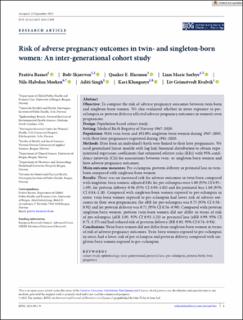Risk of adverse pregnancy outcomes in twin- and singleton-born women: An inter-generational cohort study
Basnet, Prativa; Skjaerven, Rolv; Harmon, Quaker E.; Sørbye, Linn Marie; Morken, Nils-Halvdan; Singh, Aditi; Klungsøyr, Kari; Kvalvik, Liv Grimstvedt
Peer reviewed, Journal article
Published version
Permanent lenke
https://hdl.handle.net/11250/3106581Utgivelsesdato
2023Metadata
Vis full innførselSamlinger
- Import fra CRIStin [3604]
- Institutt for helse- og omsorgsvitskap [2776]
Originalversjon
BJOG: An International Journal of Obstetrics and Gynaecology. 2023, . 10.1111/1471-0528.17690Sammendrag
Objective
To compare the risk of adverse pregnancy outcomes between twin-born and singleton-born women. We also evaluated whether in utero exposure to pre-eclampsia or preterm delivery affected adverse pregnancy outcomes in women's own pregnancies.
Design
Population-based cohort study.
Setting
Medical Birth Registry of Norway 1967–2020.
Population
9184 twin-born and 492 894 singleton-born women during 1967–2005, with their later pregnancies registered during 1981–2020.
Methods
Data from an individual's birth were linked to their later pregnancies. We used generalised linear models with log link binomial distribution to obtain exponentiated regression coefficients that estimated relative risks (RRs) with 95% confidence intervals (CIs) for associations between twin- or singleton-born women and later adverse pregnancy outcomes.
Main outcome measures
Pre-eclampsia, preterm delivery or perinatal loss in twin-born compared with singleton-born women.
Results
There was no increased risk for adverse outcomes in twin-born compared with singleton-born women: adjusted RRs for pre-eclampsia were 1.00 (95% CI 0.93–1.09), for preterm delivery 0.96 (95% CI 0.90–1.02) and for perinatal loss 1.00 (95% CI 0.84–1.18). Compared with singleton-born women exposed to pre-eclampsia in utero, twin-born women exposed to pre-eclampsia had lower risk of adverse outcomes in their own pregnancies; the aRR for pre-eclampsia was 0.73 (95% CI 0.58–0.91) and for preterm delivery was 0.71 (95% CI 0.56–0.90). Compared with preterm singleton-born women, preterm twin-born women did not differ in terms of risk of pre-eclampsia (aRR 1.05, 95% CI 0.92–1.21) or perinatal loss (aRR 0.99, 95% CI 0.71–1.37) and had reduced risk of preterm delivery (RR 0.83, 95% CI 0.74–0.94).
Conclusions
Twin-born women did not differ from singleton-born women in terms of risk of adverse pregnancy outcomes. Twin-born women exposed to pre-eclampsia in utero, had a lower risk of pre-eclampsia and preterm delivery compared with singleton-born women exposed to pre-eclampsia.

